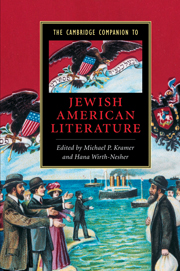Book contents
- Frontmatter
- Introduction: Jewish American literatures in the making
- 1 Beginnings and ends: the origins of Jewish American literary history
- 2 Imagining Judaism in America
- 3 Of crucibles and grandfathers: the East European immigrants
- 4 Coney Island, USA: America in the Yiddish literary imagination
- 5 Hebrew literature in America
- 6 Traces of the past: multilingual Jewish American writing
- 7 Accents of the future: Jewish American popular culture
- 8 Jewish American poetry
- 9 Jewish American writers on the Left
- 10 Jewish American renaissance
- 11 The Holocaust in the Jewish American literary imagination
- 12 Jewish American women writers and the race question
- 13 On contemporary literary theory and Jewish American poetics
- 14 Identity matters: contemporary Jewish American writing
- Index
- Series List
3 - Of crucibles and grandfathers: the East European immigrants
Published online by Cambridge University Press: 28 May 2006
- Frontmatter
- Introduction: Jewish American literatures in the making
- 1 Beginnings and ends: the origins of Jewish American literary history
- 2 Imagining Judaism in America
- 3 Of crucibles and grandfathers: the East European immigrants
- 4 Coney Island, USA: America in the Yiddish literary imagination
- 5 Hebrew literature in America
- 6 Traces of the past: multilingual Jewish American writing
- 7 Accents of the future: Jewish American popular culture
- 8 Jewish American poetry
- 9 Jewish American writers on the Left
- 10 Jewish American renaissance
- 11 The Holocaust in the Jewish American literary imagination
- 12 Jewish American women writers and the race question
- 13 On contemporary literary theory and Jewish American poetics
- 14 Identity matters: contemporary Jewish American writing
- Index
- Series List
Summary
“America is God's Crucible,” explains Russian Jewish immigrant David Quixano, protagonist of Israel Zangwill's 1908 play, The Melting-Pot, “...where all the races of Europe are melting and re-forming” (37). As he tells his Uncle Mendel, “the real American has not yet arrived. He is only in the Crucible...he will be the fusion of all races, the coming superman” (37-38). At the play's first performance at Washington's Columbia Theatre, Theodore Roosevelt listened approvingly to David's impassioned speech. The proper course for the immigrant was not in question for Roosevelt, who, a decade and a half prior to the performance, had cautioned the readership of The Forum that “the man who does not become Americanized nevertheless fails to remain a European, and becomes nothing at all” (“True Americanism,” 26). At the same time, the President did not extend his welcome indiscriminately, finding it “urgently necessary” both “to keep out laborers who tend to depress the labor market, and to keep out races which do not assimilate readily with our own” (27). While popular opinion of the time might well have put David Quixano in both categories, Roosevelt wholeheartedly approved the explicit message of the British Jewish writer's play.
From the political platform to the popular press, from the pens of reformers and sociologists, Americanization – the concept and its terms – was among the most hotly debated topics of the first half of the twentieth century. In a nation in which the foreign-born rose from 16.5 percent of the population in 1880 to 21.5 percent in 1920, such debates are not surprising (Higham, Send These to Me, 15). For those who sought to restrict immigration, eugenics arguments were almost as frequent as economic ones; they feared that the South and East European immigrants who dominated the influx in the late nineteenth and early twentieth centuries would dilute both the labor pool and the bloodlines.
- Type
- Chapter
- Information
- The Cambridge Companion to Jewish American Literature , pp. 50 - 69Publisher: Cambridge University PressPrint publication year: 2003
- 4
- Cited by

